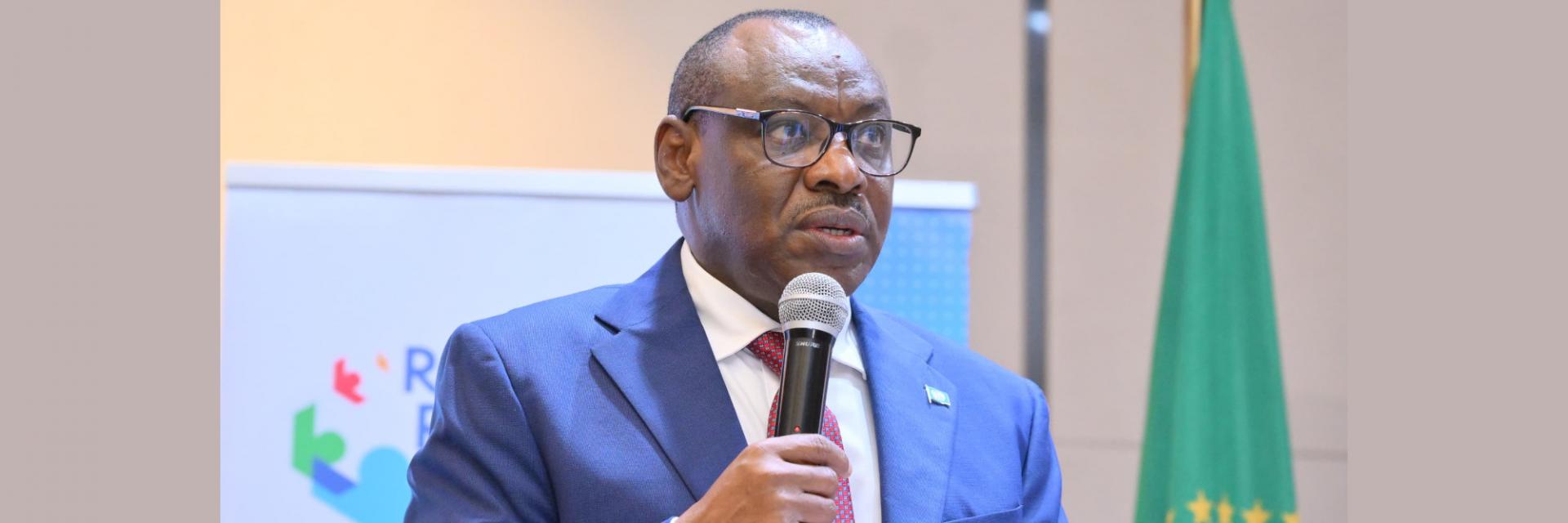2ND REGIONAL REVIEW MEETING OF THE IMPLEMENTATION OF THE GLOBAL COMPACT FOR SAFE, ORDERLY AND REGULAR MIGRATION IN AFRICA
Opening Remarks
By
Mr. Claver Gatete
United Nations Under-Secretary-General and
Executive Secretary of ECA
Addis Ababa
9 October 2024
H.E. Dr. Gedeon Themotwos, Minister of Justice of the Federal Democratic Republic of Ethiopia, and Head of the National Partnership Coalition on Migration,
HE. Mr. July Moyo, Minister Public Service, Labour and Social Welfare, Zimbabwe
and H.E. Mr. Mohamed Raman Swaray, Minister of Employment, Labour and Social Security, Sierra Leone (TBC), co-chairs of the Meeting,
H.E. Amb. Minata Samate Cessouma, Commissioner for Health, Humanitarian Affairs & Social Development, African Union Commission,
Ms. Amy Pope, Director General, International Organization for Migration, and Coordinator of the United Nations Network on Migration,
Distinguished ladies and Gentlemen,
It is a privilege to address you as we commence the 2nd Regional Review Meeting of the implementation of the Global Compact for Safe, Orderly and Regular Migration in Africa.
We meet today for a dual purpose: to address migration’s challenges and to explore the opportunities it offers for Africa’s transformation.
Migration has historically been a catalyst for development – fueling economic growth, advancing innovation and building modern states.
However, for Africa to fully realize its benefits, we must actively address the barriers impeding its positive impact.
Excellencies, Distinguished ladies and gentlemen:
Africa’s migration landscape is indeed complex, shaped by diverse factors, including financial constraints and the climate crisis – challenges that, in many cases, are not of the continent’s making.
Yet, these challenges are straining national budgets, crowding out resources for essential expenditures, and exacerbating the difficulties of responding effectively.
The consequences are clear: they include rising poverty levels, unemployment and limited social protection measures which are placing significant pressures on African countries, and intensifying the push factors that lead to migration.
While intra-African migration exceeds outward migration, the steady increase in Africans migrating to Europe, North America, and the Gulf is quite significant.
Between 2010 and 2020, African emigration surged from 20.3 million to 35.5 million, representing 14.5% of global migration.
And with over 20% of Africa’s population between the ages of 15 and 24, and youth unemployment at 60%, the continent faces significant gaps in opportunities for young people.
However, we must also acknowledge the potential within Africa to develop home-grown solutions that can contribute to job creation, economic growth and innovation.
Excellencies, Distinguished Delegates:
During our recent gathering at the United Nations, we adopted the Pact of the Future, a bold initiative aimed at unlocking vast opportunities for young people, including those related to migration.
But the question before us remains: how do we make migration a dynamic force for sustainable development across the African continent?
To do this, we must address the fundamentals, and I propose five key priorities for our consideration:
First, we must prioritize the mutual recognition of skills and qualifications across African borders.
The absence of recognition significantly hampers labour mobility and productivity.
It is essential that African professionals – whether doctors, engineers, or educators – can seamlessly apply their expertise across the continent, free from unnecessary bureaucratic constraints.
This will unlock the full potential of our workforce and advance deeper regional integration.
Second, social security systems across Africa must be reformed to allow the portability of benefits, so that migrants do not lose access to benefits such as pensions and healthcare upon crossing borders.
Enabling migrants to carry their social protections with them is not just vital for their welfare but also critical in recognizing their contributions to both their host and home countries.
Third, the African Continental Free Trade Area (AfCFTA) presents a unique opportunity to address our continent’s unemployment challenges and unlock human capital.
Accelerating the AfCFTA’s implementation will engender greater labour mobility and support our economic ambitions, beyond the movement of goods and services.
Fourth, migration policies must integrate climate resilience as climate-induced displacement is increasingly a reality for many in Africa, requiring robust frameworks to support affected individuals.
We must develop standardized operational procedures for climate migrants to ensure their protection and safeguard their rights.
Finally, Excellencies, stakeholder engagement and data-driven policymaking will be essential for effective migration management.
Comprehensive migration data must be integrated into national censuses, and cross-border collaboration will be critical for harmonizing data collection and reporting.
Engaging diverse stakeholders, like the delegates in this room, academic institutions, research bodies and experts, will deepen our understanding of migration trends and inform the design of policies that are grounded in evidence.
I have no doubt that, with the intentional commitment of all stakeholders, we can turn migration into a catalyst for Africa’s sustainable development.
As I conclude, let me ensure you that the Economic Commission for Africa remains committed to working with our member states to support the creation of robust and coherent migration frameworks.
I thank you for your kind attention.

